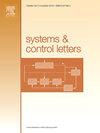Practical considerations for implementing robust-to-early termination model predictive control
IF 2.1
3区 计算机科学
Q3 AUTOMATION & CONTROL SYSTEMS
引用次数: 0
Abstract
Model Predictive Control (MPC) is widely used to achieve performance objectives, while enforcing operational and safety constraints. Despite its high performance, MPC often demands significant computational resources, making it challenging to implement in systems with limited computing capacity. A recent approach to address this challenge is to use the Robust-to-Early Termination (REAP) strategy. At any time instant, REAP converts the MPC problem into the evolution of a virtual dynamical system whose trajectory converges to the optimal solution, and provides guaranteed sub-optimal and feasible solution whenever its evolution is terminated due to limited computational power. REAP has been introduced as a continuous-time scheme and its theoretical properties have been derived under the assumption that it performs all the computations in continuous time. However, REAP should be practically implemented in discrete-time. This paper focuses on the discrete-time implementation of REAP, exploring conditions under which anytime feasibility and convergence properties are maintained when the computations are performed in discrete time. The proposed methodology is validated and evaluated through extensive simulation and experimental studies.
实现鲁棒到早期终止模型预测控制的实际考虑
模型预测控制(MPC)广泛用于实现性能目标,同时加强操作和安全约束。尽管MPC具有高性能,但它通常需要大量的计算资源,这使得在计算能力有限的系统中实现MPC具有挑战性。解决这一挑战的最新方法是使用健壮到早期终止(REAP)策略。在任何时刻,REAP都将MPC问题转化为一个轨迹收敛于最优解的虚拟动力系统的演化,并在其演化因计算能力有限而终止时提供保证的次最优可行解。作为一种连续时间格式引入了REAP,并在假定它在连续时间内完成所有计算的前提下推导了它的理论性质。但是,实际上应该在离散时间内实现REAP。本文重点研究了REAP的离散时间实现,探讨了在离散时间进行计算时保持随时可行性和收敛性的条件。所提出的方法通过广泛的模拟和实验研究进行了验证和评估。
本文章由计算机程序翻译,如有差异,请以英文原文为准。
求助全文
约1分钟内获得全文
求助全文
来源期刊

Systems & Control Letters
工程技术-运筹学与管理科学
CiteScore
4.60
自引率
3.80%
发文量
144
审稿时长
6 months
期刊介绍:
Founded in 1981 by two of the pre-eminent control theorists, Roger Brockett and Jan Willems, Systems & Control Letters is one of the leading journals in the field of control theory. The aim of the journal is to allow dissemination of relatively concise but highly original contributions whose high initial quality enables a relatively rapid review process. All aspects of the fields of systems and control are covered, especially mathematically-oriented and theoretical papers that have a clear relevance to engineering, physical and biological sciences, and even economics. Application-oriented papers with sophisticated and rigorous mathematical elements are also welcome.
 求助内容:
求助内容: 应助结果提醒方式:
应助结果提醒方式:


